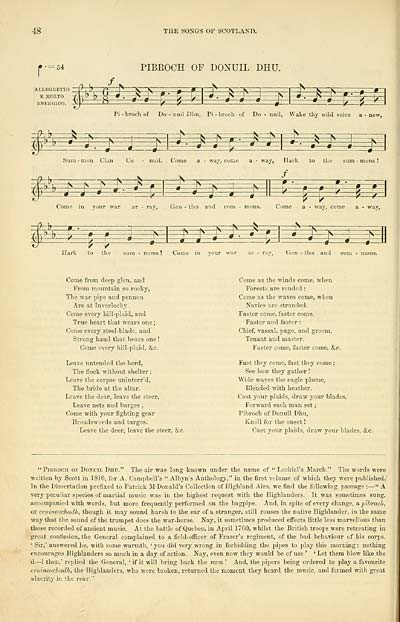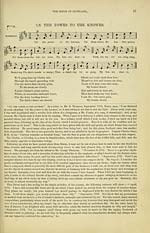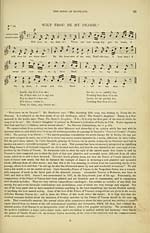Glen Collection of printed music > Printed music > Wood's edition of the songs of Scotland
(72) Page 48 - Pibroch of Donuil dhu
Download files
Complete book:
Individual page:
Thumbnail gallery: Grid view | List view

48
THE SONGS OF SCOTLAND.
54
PIBROCH OF DONUIL DHU.
ALLEGRETTO
E MOLTO
./'
&
S--S
5
-w^f?
:*^£
3^S
m
^^^f^Z
w=^
Pi-broch of Do - nuil Dhu, Pi - broch of Do - nuil, Wake thy wild voice a - new,
t=*=
E^gi^i^i^
S
Sam - mon Clan Co - nuil. Come a - way, come a - way, Hark to the sum - mons !
f) 1
*.
X.
/
V .9 .
^ i»
p
• •
/I K i P*
r
« •
\ ' *■
9
l(\\ * -J
* _■
r~
i"
V r r V
a
vv m
• • l>
* m m
'/ '
>
u
Come
ft 1.
in your war ar - ray,
Gen - ties and com -
mons.
s
? 1/
Come a - way, come
a - way,
V I v P
•
i
v N P
ft
|"
\
A \> k i
k
I l>
^ J
J^ II
k. !
\hP 2 [<_
G F «
■ T I
. J — **— — r — l
1
^ J
— g — b-
m a
* —
•
•-
Hark to the sum - mons ! Come in your war ar - ray, Gen - ties and com - mons.
Come from deep glen, and
From mountain so rocky,
The war-pipe and pennon
Are at Inverlochy.
Come every hill-plaid, and
True heart that wears one ;
Come every steel-blade, and
Strong hand that bears one !
Come every hill-plaid, &c.
Leave untended the herd,
The flock without shelter ;
Leave the corpse uninterr'd,
The bride at the altar.
Leave the dear, leave the steer,
Leave nets and barges ;
Come with your fighting gear
Broadswords and targes.
Leave the deer, leave the steer, &c.
Come as the winds come, when
Forests are rended :
Come as the waves come, when
Navies are stranded.
Faster come, faster come,
Faster and faster :
Chief, vassal, page, and groom,
Tenant and master.
Faster come, faster come, &c.
Fast they come, fast they come ;
See how they gather !
Wide waves the eagle plume,
Blended with heather.
Cast your plaids, draw your blades,
Forward each man set ;
Pibroch of Donuil Dhu,
Knell for the onset !
Cast your plaids, draw your blades, &c.
" Pibroch or Donuil Dhu." The air was long known under the name of " Loclriel's March." The words were
written by Scott in 1816, for A. Campbell's " Albyn's Anthology," in the first volume of which they were published.'
In the Dissertation prefixed to Patrick M'Donald's Collection of Highland Airs, we find the following passage : — " A
very peculiar species of martial music was in the highest request with the Highlanders. It was sometimes sung,
accompanied with words, but more frequently performed on the bagpipe. And, in spite of every change, a pibroch,
or cruineachadh, though it may sound harsh to the ear of a stranger, still rouses the native Highlander, in the same
way that the sound of the trumpet does the war-horse. Nay, it sometimes produced effects little less marvellous than
those recorded of ancient music. At the battle of Quebec, in April 1760, whilst the British troops were retreating in
great confusion, the General complained to a field-officer of Fraser's regiment, of the bad behaviour of his corps.
' Sir,' answered he, with some warmth, ' you did very wrong in forbidding the pipes to play this morning : nothing
encourages Highlanders so much in a day of action. Nay, even now they would be of use.' 'Let them blow like the
d — 1 then,' replied the General, ' if it will bring back the men.' And, the pipers being ordered to play a favourite
cruineachadh, the Highlanders, who were broken, returned the moment they heard the music, and formed with great
alacrity in the rear."
THE SONGS OF SCOTLAND.
54
PIBROCH OF DONUIL DHU.
ALLEGRETTO
E MOLTO
./'
&
S--S
5
-w^f?
:*^£
3^S
m
^^^f^Z
w=^
Pi-broch of Do - nuil Dhu, Pi - broch of Do - nuil, Wake thy wild voice a - new,
t=*=
E^gi^i^i^
S
Sam - mon Clan Co - nuil. Come a - way, come a - way, Hark to the sum - mons !
f) 1
*.
X.
/
V .9 .
^ i»
p
• •
/I K i P*
r
« •
\ ' *■
9
l(\\ * -J
* _■
r~
i"
V r r V
a
vv m
• • l>
* m m
'/ '
>
u
Come
ft 1.
in your war ar - ray,
Gen - ties and com -
mons.
s
? 1/
Come a - way, come
a - way,
V I v P
•
i
v N P
ft
|"
\
A \> k i
k
I l>
^ J
J^ II
k. !
\hP 2 [<_
G F «
■ T I
. J — **— — r — l
1
^ J
— g — b-
m a
* —
•
•-
Hark to the sum - mons ! Come in your war ar - ray, Gen - ties and com - mons.
Come from deep glen, and
From mountain so rocky,
The war-pipe and pennon
Are at Inverlochy.
Come every hill-plaid, and
True heart that wears one ;
Come every steel-blade, and
Strong hand that bears one !
Come every hill-plaid, &c.
Leave untended the herd,
The flock without shelter ;
Leave the corpse uninterr'd,
The bride at the altar.
Leave the dear, leave the steer,
Leave nets and barges ;
Come with your fighting gear
Broadswords and targes.
Leave the deer, leave the steer, &c.
Come as the winds come, when
Forests are rended :
Come as the waves come, when
Navies are stranded.
Faster come, faster come,
Faster and faster :
Chief, vassal, page, and groom,
Tenant and master.
Faster come, faster come, &c.
Fast they come, fast they come ;
See how they gather !
Wide waves the eagle plume,
Blended with heather.
Cast your plaids, draw your blades,
Forward each man set ;
Pibroch of Donuil Dhu,
Knell for the onset !
Cast your plaids, draw your blades, &c.
" Pibroch or Donuil Dhu." The air was long known under the name of " Loclriel's March." The words were
written by Scott in 1816, for A. Campbell's " Albyn's Anthology," in the first volume of which they were published.'
In the Dissertation prefixed to Patrick M'Donald's Collection of Highland Airs, we find the following passage : — " A
very peculiar species of martial music was in the highest request with the Highlanders. It was sometimes sung,
accompanied with words, but more frequently performed on the bagpipe. And, in spite of every change, a pibroch,
or cruineachadh, though it may sound harsh to the ear of a stranger, still rouses the native Highlander, in the same
way that the sound of the trumpet does the war-horse. Nay, it sometimes produced effects little less marvellous than
those recorded of ancient music. At the battle of Quebec, in April 1760, whilst the British troops were retreating in
great confusion, the General complained to a field-officer of Fraser's regiment, of the bad behaviour of his corps.
' Sir,' answered he, with some warmth, ' you did very wrong in forbidding the pipes to play this morning : nothing
encourages Highlanders so much in a day of action. Nay, even now they would be of use.' 'Let them blow like the
d — 1 then,' replied the General, ' if it will bring back the men.' And, the pipers being ordered to play a favourite
cruineachadh, the Highlanders, who were broken, returned the moment they heard the music, and formed with great
alacrity in the rear."
Set display mode to: Large image | Transcription
Images and transcriptions on this page, including medium image downloads, may be used under the Creative Commons Attribution 4.0 International Licence unless otherwise stated. ![]()
| Special collections of printed music > Glen Collection of printed music > Printed music > Wood's edition of the songs of Scotland > (72) Page 48 - Pibroch of Donuil dhu |
|---|
| Permanent URL | https://digital.nls.uk/91338607 |
|---|
| Description | Scottish songs and music of the 18th and early 19th centuries, including music for the Highland bagpipe. These are selected items from the collection of John Glen (1833 to 1904). Also includes a few manuscripts, some treatises, and other books on the subject. |
|---|
| Description | The Glen Collection and the Inglis Collection represent mainly 18th and 19th century Scottish music, including Scottish songs. The collections of Berlioz and Verdi collected by bibliographer Cecil Hopkinson contain contemporary and later editions of the works of the two composers Berlioz and Verdi. |
|---|

